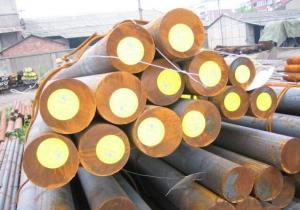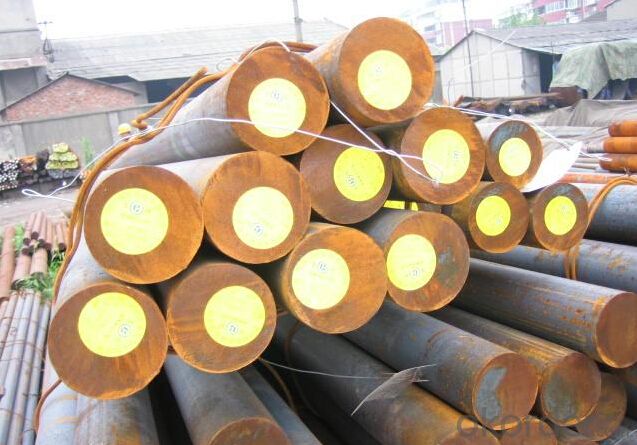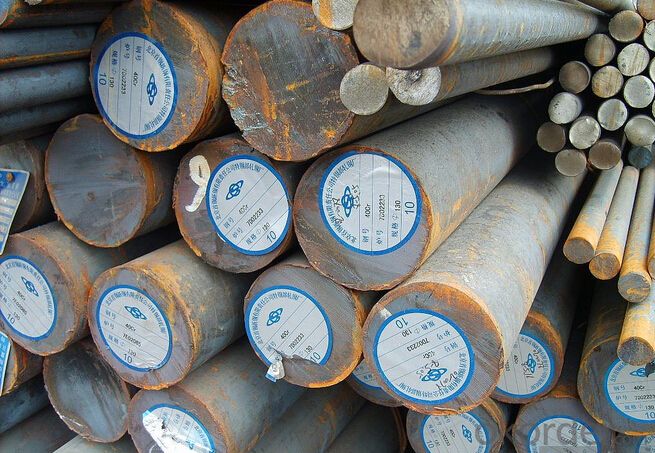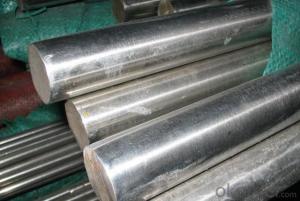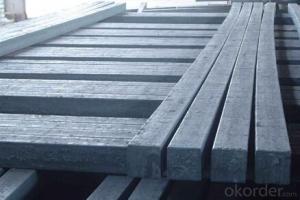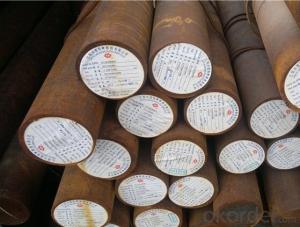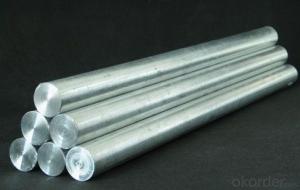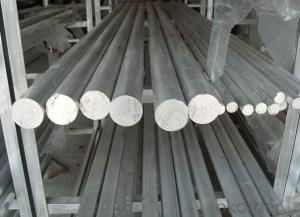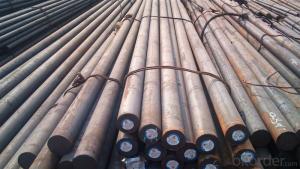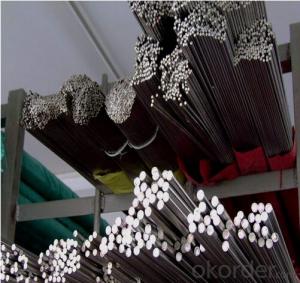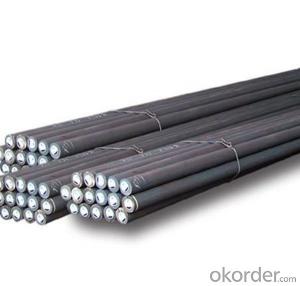5CrNiMoV Tool Steel Special Steel Carbon Steel
- Loading Port:
- China main port
- Payment Terms:
- TT OR LC
- Min Order Qty:
- 25 m.t.
- Supply Capability:
- 10000 m.t./month
OKorder Service Pledge
OKorder Financial Service
You Might Also Like
Specification
Chemical Composition%(GB)
| C | Si | Mn | Ni | Cr | Mo |
| 0.49-0.54 | 0.2-0.3 | 0.95-1.05 | 1.95-2.10 | 0.95-1.10 | 0.45-0.55 |
Characterstics
| 1.High toughness and strength | |||||||
| 2.Higher abrasion resistance | |||||||
| 3.Remaining hardness of HB300 at 500℃ | |||||||
| 4.Insensitive to tempering brittleness due to addition of Mo |
Applications: Suitable for large and medium sized forging dies with thickness of 250-350mm for automobiles,tractors,transmission gears,front axle beams and rear axles of automobiles,and forging dies for engineering machine components


1, Your advantages?
professional products inquiry, products knowledge train (for agents), smooth goods delivery, excellent customer solution proposale
2, Test & Certificate?
SGS test is available, customer inspection before shipping is welcome, third party inspection is no problem
3, Payment Terms?
30% TT as deposit and 70% before delivery.
Irrevocable L/C at sight.
4, Trading Terms?
EXW, FOB, CIF, FFR, CNF
6, After-sale Service?
We provides the services and support you need for every step of our cooperation. We're the business partner you can trust.
For any problem, please kindly contact us at any your convenient time.
We'll reply you in our first priority within 24 hours.
- Q: What are the properties of free-cutting steel?
- Free-cutting steel is a type of steel that is specifically designed to enhance machinability, making it easier to cut and shape with minimal effort. It possesses certain properties such as high sulfur content, which promotes the formation of manganese sulfide inclusions, improving chip formation during machining. It also typically contains elements like phosphorus, lead, or bismuth, which act as lubricants and reduce friction during cutting operations. Additionally, free-cutting steel has excellent surface finish, good dimensional accuracy, and high production efficiency, making it widely used in industries where machining speed and efficiency are crucial.
- Q: What are the applications of special steel in the marine sector?
- Special steel is extensively used in the marine sector due to its unique properties. It is used in various applications such as shipbuilding, offshore platforms, and marine equipment manufacturing. Special steel provides excellent corrosion resistance, high strength, and durability, making it ideal for marine environments that are highly corrosive and subject to extreme conditions. It is used for constructing hulls, propeller shafts, pipelines, and various components of ships and offshore structures. Additionally, special steel's ability to withstand impact and fatigue makes it suitable for marine applications where safety and reliability are crucial.
- Q: How is special steel classified based on its mechanical properties?
- Special steel is classified based on its mechanical properties by considering factors such as its strength, hardness, toughness, and ductility. These properties play a crucial role in determining the steel's ability to withstand specific applications and environments.
- Q: How is corrosion-resistant stainless steel used in the production of marine equipment?
- Corrosion-resistant stainless steel is extensively used in the production of marine equipment due to its ability to withstand harsh marine environments. It is commonly used in the construction of ship hulls, propellers, valves, pumps, and other critical components. The stainless steel's resistance to corrosion helps prevent damage caused by saltwater, which can significantly extend the lifespan of the equipment and ensure its reliability and safety at sea.
- Q: What are the specific requirements for special steel used in the nuclear waste storage industry?
- The specific requirements for special steel used in the nuclear waste storage industry include high corrosion resistance to withstand the harsh and corrosive environment of nuclear waste, excellent mechanical properties to maintain structural integrity over long periods of time, low susceptibility to radiation-induced embrittlement, and the ability to retain its properties even at elevated temperatures. Additionally, the steel must meet stringent standards for radiation shielding and must be able to prevent the release of radioactive materials into the environment.
- Q: How does the hardness of special steel affect its machinability?
- The hardness of special steel has a significant impact on its machinability. In general, as the hardness of the steel increases, its machinability decreases. Machinability refers to the ease with which a material can be machined or shaped using various machining processes such as cutting, drilling, or milling. Hardness is a measure of a material's resistance to indentation or scratching. It is typically measured using the Rockwell hardness scale or the Brinell hardness test. Special steel, which is known for its high strength and durability, often has a higher hardness compared to other types of steel. When machining special steel, a harder material poses challenges for several reasons. Firstly, harder materials are more difficult to cut, as they require higher cutting forces and generate more heat during the machining process. This can lead to increased tool wear and shorter tool life, resulting in higher production costs. Secondly, hard steel tends to have lower ductility and toughness, making it more prone to cracking or chipping during machining. This can lead to poor surface finish, dimensional inaccuracies, and even component failure. Moreover, the increased hardness of special steel also affects chip formation. Harder materials tend to produce shorter and more segmented chips, which can cause issues with chip evacuation and tool clogging. This can further hinder the machining process and affect the overall productivity. To improve the machinability of hard special steel, various strategies can be employed. The selection of appropriate cutting tools with specific geometries and coatings designed for hard materials is crucial. Additionally, optimizing cutting parameters such as cutting speed, feed rate, and depth of cut can help reduce the negative effects of hardness on machinability. In conclusion, the hardness of special steel has a direct impact on its machinability. As the hardness increases, the machinability decreases due to increased cutting forces, higher tool wear, reduced ductility, and chip formation challenges. However, with proper tool selection and optimization of cutting parameters, the machinability of hard special steel can be improved, enabling efficient and cost-effective machining processes.
- Q: How does special steel contribute to the agricultural machinery industry?
- The agricultural machinery industry heavily relies on special steel to improve the overall efficiency, durability, and productivity of agricultural equipment. A major advantage of special steel in this industry is its exceptional strength and toughness, which allows for the production of robust and reliable machinery. Agricultural equipment, including tractors, combines, and harvesters, often faces intense operational conditions such as heavy loads, extreme temperatures, and exposure to corrosive elements. Special steel provides the necessary strength and resistance to withstand these challenging environments, ensuring optimal performance for extended periods. Furthermore, special steel alloys offer excellent wear resistance, enabling agricultural machinery to endure the abrasive nature of farming operations. This is especially crucial for components like blades, plows, and tillage tools, which are constantly exposed to soil, rocks, and other abrasive materials. By utilizing high-quality special steel, manufacturers can manufacture durable and long-lasting equipment, reducing maintenance requirements and improving the overall reliability of agricultural machinery. In addition, special steel allows for the development and construction of more efficient agricultural machinery. Thanks to its superior strength-to-weight ratio, special steel facilitates the production of lighter yet robust equipment. Consequently, this improves fuel efficiency, reduces energy consumption, and enhances maneuverability. Moreover, special steel's excellent machinability and formability enable manufacturers to create intricate and customized components, meeting specific agricultural needs and increasing machinery efficiency. Moreover, special steel contributes to the agricultural machinery industry by providing resistance to corrosion and rust. Agricultural equipment is often exposed to moisture, fertilizers, and chemicals, which can result in corrosion and degradation over time. Special steel alloys with corrosion-resistant properties, such as stainless steel, can significantly prolong the lifespan of machinery and reduce maintenance costs. In conclusion, special steel is indispensable for the agricultural machinery industry as it enhances the durability, efficiency, and productivity of equipment. Its strength, wear resistance, design flexibility, and corrosion-resistant properties make it the preferred choice for manufacturing high-quality machinery capable of withstanding the demanding conditions of agricultural operations.
- Q: What are the properties of corrosion-resistant stainless tool steel?
- Corrosion-resistant stainless tool steel possesses several properties that make it highly suitable for various applications. Firstly, it exhibits exceptional resistance to corrosion, even in harsh environments, due to the presence of a high percentage of chromium in its composition. This resistance helps prevent the formation of rust, stains, or pitting, ensuring durability and longevity. Additionally, this type of steel maintains its mechanical strength and hardness at elevated temperatures, making it ideal for tools and equipment subjected to high heat or wear. Furthermore, corrosion-resistant stainless tool steel offers excellent machinability, allowing for ease of shaping, cutting, and forming. Its combination of corrosion resistance, strength, and machinability makes it a popular choice for various industries, including manufacturing, construction, and automotive.
- Q: What are the main challenges in welding special steel?
- The main challenges in welding special steel typically include issues such as high heat input requirements, susceptibility to cracking, and the need for precise preheating and post-weld heat treatment. Additionally, the presence of alloying elements in special steel can make it more difficult to achieve the desired mechanical properties and require careful selection of filler materials.
- Q: How does tungsten contribute to the properties of special steel?
- Tungsten contributes to the properties of special steel by improving its hardness, strength, and resistance to wear and corrosion. It also enhances the steel's ability to retain its shape and withstand high temperatures, making it suitable for various industrial applications such as cutting tools, electrical contacts, and parts for aerospace and automotive industries.
Send your message to us
5CrNiMoV Tool Steel Special Steel Carbon Steel
- Loading Port:
- China main port
- Payment Terms:
- TT OR LC
- Min Order Qty:
- 25 m.t.
- Supply Capability:
- 10000 m.t./month
OKorder Service Pledge
OKorder Financial Service
Similar products
Hot products
Hot Searches
Related keywords
